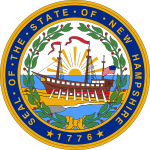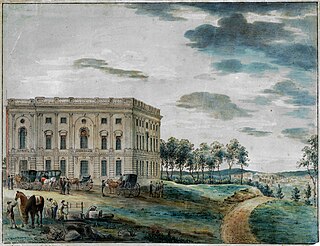
The 12th United States Congress was a meeting of the legislative branch of the United States federal government, consisting of the United States Senate and the United States House of Representatives. It met in Washington, D.C. from March 4, 1811, to March 4, 1813, during the third and fourth years of James Madison's presidency. The apportionment of seats in the House of Representatives was based on the 1800 United States census. Both chambers had a Democratic-Republican majority.

John Wingate Weeks was an American banker and politician from Massachusetts. A Republican, he served as Mayor of Newton from 1902 to 1903, a United States representative from 1905 to 1913, United States Senator from 1913 to 1919, and Secretary of War from 1921 to 1925.
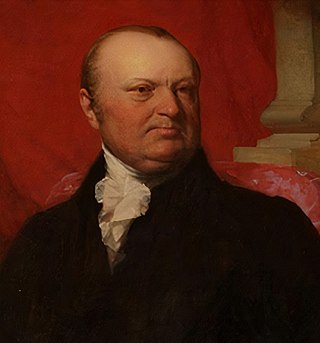
John Taylor Gilman was a farmer, shipbuilder and statesman from Exeter, New Hampshire. He represented New Hampshire in the Continental Congress in 1782–1783 and was the fifth governor of New Hampshire for 14 years, from 1794 to 1805, and from 1813 to 1816.

William Plumer was an American lawyer, Baptist lay preacher, and politician from Epping, New Hampshire. He is most notable for his service as a Federalist in the United States Senate (1802–1807), and the seventh governor of New Hampshire as a Democratic-Republican.
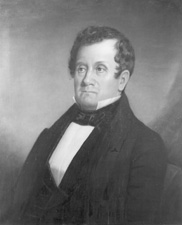
John Page was an American farmer and politician from Haverhill, New Hampshire. He represented New Hampshire in the United States Senate and served as the 17th governor of New Hampshire from 1839 to 1842.

The 1824–25 United States House of Representatives elections were held on various dates in various states between July 7, 1824, and August 30, 1825. Each state set its own date for its elections to the House of Representatives before the first session of the 19th United States Congress convened on December 5, 1825. Elections were held for all 213 seats, representing 24 states.
The 1814–15 United States House of Representatives elections were held on various dates in various states between April 26, 1814 and August 10, 1815. Each state set its own date for its elections to the House of Representatives before the first session of the 14th United States Congress convened on December 4, 1815. They occurred during President James Madison's second term. Elections were held for all 182 seats, representing 18 states.

The 1812–13 United States House of Representatives elections were held on various dates in various states between August 3, 1812 and April 30, 1813. Each state set its own date for its elections to the House of Representatives before the first session of the 13th United States Congress convened on May 24, 1813. They coincided with James Madison being re-elected president.

The 1788–89 United States House of Representatives elections were the first U.S. House of Representatives elections following the adoption of the Constitution of the United States. Each state set its own date for its congressional elections, ranging from November 24, 1788, to March 5, 1789, before or after the first session of the 1st United States Congress convened on March 4, 1789. They coincided with the election of George Washington as the first president of the United States.

William Badger was an American manufacturer and mill owner from Gilmanton, New Hampshire. He served in both houses of the New Hampshire state legislature and was the 15th governor of New Hampshire from 1834 to 1836.
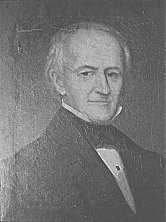
Henry Hubbard was a member of the United States House of Representatives from 1829 to 1835, a Senator from New Hampshire during 1835 to 1841, and the 18th governor of New Hampshire from 1842 to 1844.

Joseph Cilley was a United States senator from New Hampshire.
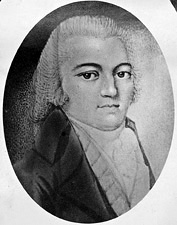
John Fabyan Parrott was a United States representative and a Senator from New Hampshire.
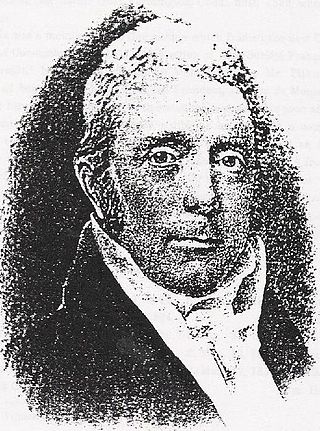
Opposition to the War of 1812 was widespread in the United States, especially in New England. Many New Englanders opposed the conflict on political, economic, and religious grounds. When the Embargo Act of 1807 failed to remedy the situation with the United Kingdom, with Britain refusing to rescind the Orders in Council (1807) and the French continuing their decrees, certain Democratic-Republicans known as war hawks felt compelled to persuade the United States government to declare war on the British. A number of contemporaries called it, "The second war for independence." Henry Clay and John Calhoun pushed a declaration of war through Congress, stressing the need to uphold American honor and independence. Speaking of the impact of the depressed cotton trade upon his fellow Southerners, Calhoun told Congress that:
Josiah Butler was an American politician and a United States representative from New Hampshire.
Francis White was a distinguished early American lawyer and politician in what was then the U.S. state of Virginia.
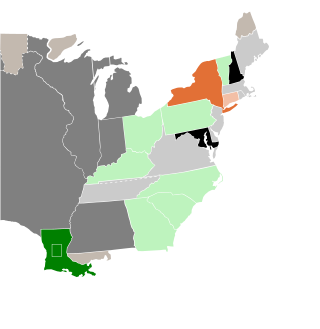
The 1812–13 United States Senate elections were held on various dates in various states, coinciding with President James Madison's re-election. As these U.S. Senate elections were prior to the ratification of the Seventeenth Amendment in 1913, senators were chosen by state legislatures. Senators were elected over a wide range of time throughout 1812 and 1813, and a seat may have been filled months late or remained vacant due to legislative deadlock. In these elections, terms were up for the senators in Class 3.

The 1812 United States elections elected the members of the 13th United States Congress. The election took place during the First Party System, and shortly after the start of the War of 1812. The Federalist Party made a relatively strong showing, winning seats in both chambers while supporting a competitive challenge to the incumbent Democratic-Republican President. However, the Democratic-Republican Party continued its control of the Presidency and both houses of Congress.

The 1892 United States presidential election in New Hampshire took place on November 8, 1892, as part of the 1892 United States presidential election. Voters chose four representatives, or electors to the Electoral College, who voted for president and vice president.

The 1812 New Hampshire gubernatorial election was held on March 10, 1812.
